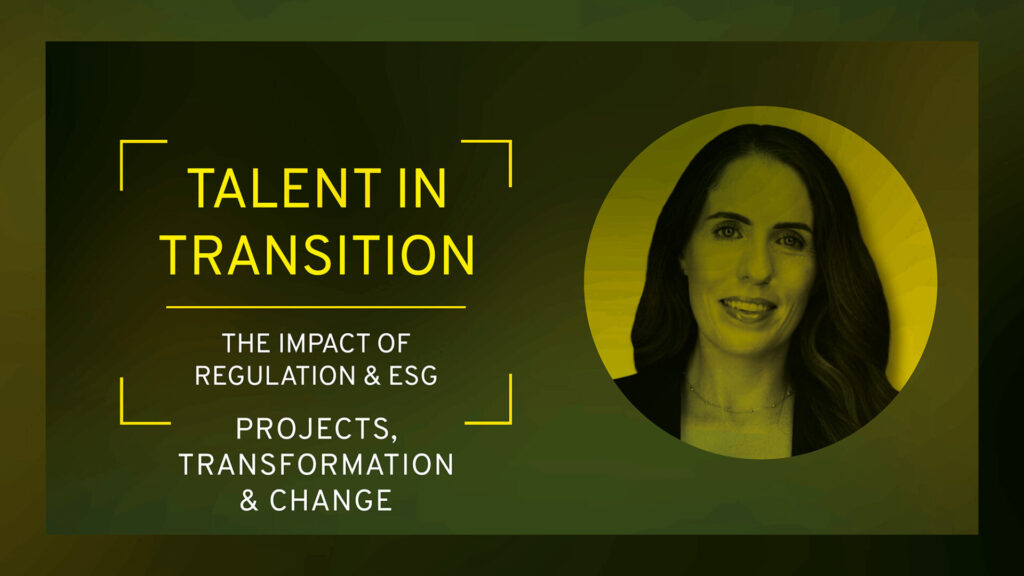The evolving regulatory and compliance landscape continues to shape and reshape the Irish business landscape. New and updated legislation, from DORA and SOX to the EU Data Act and CSRD, pushes businesses to reassess their operating models, strengthen internal controls, and elevate their reporting capabilities. This, in turn, changes the structure of transformation and project functions, as well as those best placed to lead them.
There has been a surge in demand for talent across projects, transformation and change functions, particularly in roles at the intersection of compliance, risk, operations, finance and technology. At Barden, we see this play out across sectors, including financial services, pharma, technology, fintech, and beyond, as companies respond to increased scrutiny, new standards, and heightened expectations from regulators, investors, and the public alike.
From Generalists to Specialists
There has been a rise in specialist roles related to ESG readiness, IT and business controls, and internal control frameworks, particularly in response to regulatory programmes such as SOX and DORA.
For example, SOX compliance has become a key focus for Irish entities that are either newly US-listed or have been listed for some time but are now investing in ICFR (Internal Control over Financial Reporting) transformation. These initiatives often involve automation, control mapping, and technology integration, leading to increased demand for programme leads, finance systems specialists, and professionals with experience in both IT and business controls.

Companies embedding AI into operations, especially those in regulated industries like financial services and pharma, are starting to scope roles focused on ethical AI use and legislative alignment.
Tax is another active space. Companies are hiring tax technology specialists to navigate emerging digital tax frameworks and to automate their compliance processes, especially as cross-border and digital goods taxation continues to evolve. (More on this from my colleague Kate Flanagan here>>>>)

With the rise of new regulatory and compliance demands, a significant crossover has occurred, particularly from the agnostic vertical to SME. For instance, a Project Lead who has spent the last two years working on a DORA readiness programme will now likely be considered an SME in DORA. This trend of talent becoming more specialised in response to emerging regulations is expected to continue and intensify over the coming years. This migration from generalist to specialist is reshaping the talent landscape, creating new career paths and opportunities.
Compliance at the Core of Change
Project and change professionals are no longer operating on the periphery of compliance; they are being pulled into the centre of it. Whether it’s leading SOX readiness programmes, DORA implementation, ESG reporting readiness, or integrating cybersecurity and privacy solutions, transformation teams are increasingly at the forefront of regulatory and compliance initiatives. This shift requires new capabilities, including understanding the language of controls, compliance, and regulation and designing change initiatives that meet both business and regulatory objectives.
For employers, this means the talent profile is evolving. It’s not enough to find someone who can manage scope, time and budget and, indeed, deliver the transformation agenda.

This is leading to increased demand for regulatory-aware programme leads, risk-literate business analysts, and project managers with a grounding in control frameworks.
The most successful professionals in this field blend strong delivery skills while gaining a deep understanding of regulation in the specific industry, enabling businesses to accelerate change while staying compliant.
The Role of Consulting Firms
Consulting firms continue to lead the way in regulatory transformation. With the ability to invest ahead of demand, they’re often first to develop capabilities in areas like ESG/CSRD, DORA, and finance compliance. In contrast, industry tends to follow, relying initially on consultants to deliver critical projects before gradually building internal teams.
In practice, many organisations engage consulting firms to deliver programmes such as SOX or ESG readiness, sometimes over multiple years.

If a project fails internally, the responsibility lies with the business. If a project fails with a consultancy at the helm, the risk is more distributed, an important distinction for boards and leadership teams.
Ultimately, companies aim to build these capabilities in-house, but the transition takes time, investment, and clear pathways for internal upskilling of talent.
What’s Next?
The regulatory landscape will continue to evolve with the convergence of regulation, technology, data and compliance. Some of the significant upcoming regulatory impacts over the last 12 months include:
CSRD EU Omnibus Act: This is aimed at streamlining and reducing the administrative burden of sustainability-related regulations, meaning companies are navigating a high level of uncertainty as the legislation process is ongoing. They are required to adapt their ESG reporting approach while simultaneously navigating ambiguity. This has impacted both professional service organisations, who ramped up their ESG teams to support client readiness programmes over the last few years, and industry organisations. Companies originally in scope for ESG reporting had begun onboarding and hiring specific ESG readiness roles. These roles were either standalone or within a current transformation programme (i.e. Finance, Risk and Compliance). We have experienced organisations pause further hiring in this area or hire at a reduced level during this period of flux.
DORA (Digital Operational Resilience Act): This regulation is designed to ensure that the EU financial system can withstand, respond to, and recover quickly from any digital disruption, whether caused by cyberattacks, IT failures or issues with third-party providers. Organisations have ramped up DORA readiness teams over the last few years. They will continue to do so, including Operational Resilience / DORA Programme Manager, Project Leads, Systems specialists, Business and Data Analysts, Technology Risk & Controls Lead etc.
Final Thoughts
As the regulatory landscape continues to evolve, it is imperative that businesses continually adapt to stay compliant. The increasing complexity of regulations is reshaping the skill set required by transformation professionals. The shift towards specialisation within transformation roles is a response to new regulations and an opportunity for professionals to grow into strategic drivers of change.
Contact Catherine at catherine.drysdale@barden.ie or via LinkedIn.


 Jump Back
Jump Back

